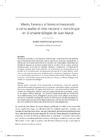Identificador persistente para citar o vincular este elemento:
https://accedacris.ulpgc.es/handle/10553/14213
| Campo DC | Valor | idioma |
|---|---|---|
| dc.contributor.author | Dominguez Quintana, Ruben | en_US |
| dc.date.accessioned | 2015-08-07T08:47:29Z | - |
| dc.date.accessioned | 2018-03-15T14:35:46Z | - |
| dc.date.available | 2015-08-07T08:47:29Z | - |
| dc.date.available | 2018-03-15T14:35:46Z | - |
| dc.date.issued | 2012 | en_US |
| dc.identifier.issn | 1475-3839 | en_US |
| dc.identifier.other | Dialnet | |
| dc.identifier.uri | https://accedacris.ulpgc.es/handle/10553/14213 | - |
| dc.description.abstract | Durante la transición a la democracia tuvieron lugar numerosas reformas políticas que el franquismo había reprimido bajo el yugo de sus principios nacionalistas. Los avances democráticos dotaron a las Comunidades Autónomas de órganos propios en que Cataluña implican la legislación y el fomento de la lengua catalana. Estas serán las coordenadas para el estudio del protagonista de El amante bilingüe según las cuales deberá enfrentar una nueva realidad social, emocional y lingüística. El asalto a ese desconocido panorama en Cataluña obliga a Marés a encontrar una identidad nueva desde donde hacer frente a conflictos análogos a los vividos en su pasado monolingüe. | en_US |
| dc.description.abstract | During Spain's transition from dictatorship to democracy, numerous political reforms were introduced against Franco's repressive, nationalistic regime. As Spanish democracy progressed, all regions developed their own governmental bodies that created new nationalistic policies, such as Catalonia being able to promote Catalan as the region's official language. This historical backdrop provides the framework to an understanding of our protagonist's journey in El Amante Bilingüe, as he faces a new social, emotional and linguistic reality. Confronting this foreign paradigm of a new democratic Catalonia forces Marés to develop a new identity that will help him deal with conflicts he had already faced during his monolingual past. | en_US |
| dc.language | spa | en_US |
| dc.relation.ispartof | Bulletin of Hispanic Studies | en_US |
| dc.source | Bulletin of Hispanic Studies [ISSN 1475-3839], v. 89 (3), p. 293-301 | en_US |
| dc.subject | 62 Ciencias de las artes y las letras | en_US |
| dc.subject.other | Nacionalismo | en_US |
| dc.subject.other | Identidad | en_US |
| dc.subject.other | Cataluña | en_US |
| dc.subject.other | Lengua | en_US |
| dc.subject.other | Franquismo | en_US |
| dc.subject.other | España | en_US |
| dc.title | Marés, Faneca y el torero enmascarado o cómo asaltar el mito nacional y monolingüe en "El amante bilingüe" de Juan Marsé | en_US |
| dc.type | info:eu-repo/semantics/Article | en_US |
| dc.type | Article | en_US |
| dc.identifier.doi | 10.3828/bhs.2012.21 | en_US |
| dc.identifier.scopus | 2-s2.0-84859493100 | - |
| dc.identifier.isi | 000303269900005 | - |
| dc.identifier.url | http://dialnet.unirioja.es/servlet/articulo?codigo=4174129 | - |
| dc.identifier.absysnet | 713823 | - |
| dc.identifier.crisid | 24247 | - |
| dc.description.lastpage | 301 | - |
| dc.identifier.issue | 3 | - |
| dc.description.firstpage | 293 | - |
| dc.relation.volume | 89 | - |
| dc.investigacion | Artes y Humanidades | en_US |
| dc.rights.accessrights | info:eu-repo/semantics/openAccess | - |
| dc.type2 | Artículo | en_US |
| dc.contributor.daisngid | 32285694 | |
| dc.contributor.authordialnetid | 2545636 | - |
| dc.identifier.dialnet | 4174129ARTREV | - |
| dc.contributor.wosstandard | WOS:Quintana, RD | |
| dc.date.coverdate | 2012 | |
| dc.identifier.ulpgc | Sí | es |
| dc.description.sjr | 0,101 | |
| dc.description.sjrq | Q2 | |
| dc.description.ahci | AHCI | |
| item.grantfulltext | open | - |
| item.fulltext | Con texto completo | - |
| crisitem.author.dept | GIR Investigaciones literarias y lingüísticas en español | - |
| crisitem.author.dept | IU de Análisis y Aplicaciones Textuales | - |
| crisitem.author.orcid | 0000-0001-8972-5398 | - |
| crisitem.author.parentorg | Departamento de Filología Hispánica Clásica y de Estudios Árabes y Orientales | - |
| crisitem.author.fullName | Dominguez Quintana,Ruben | - |
| Colección: | Artículos | |
Visitas
130
actualizado el 18-may-2024
Descargas
201
actualizado el 18-may-2024
Google ScholarTM
Verifica
Altmetric
Comparte
Exporta metadatos
Este elemento está sujeto a una licencia Licencia Creative Commons

